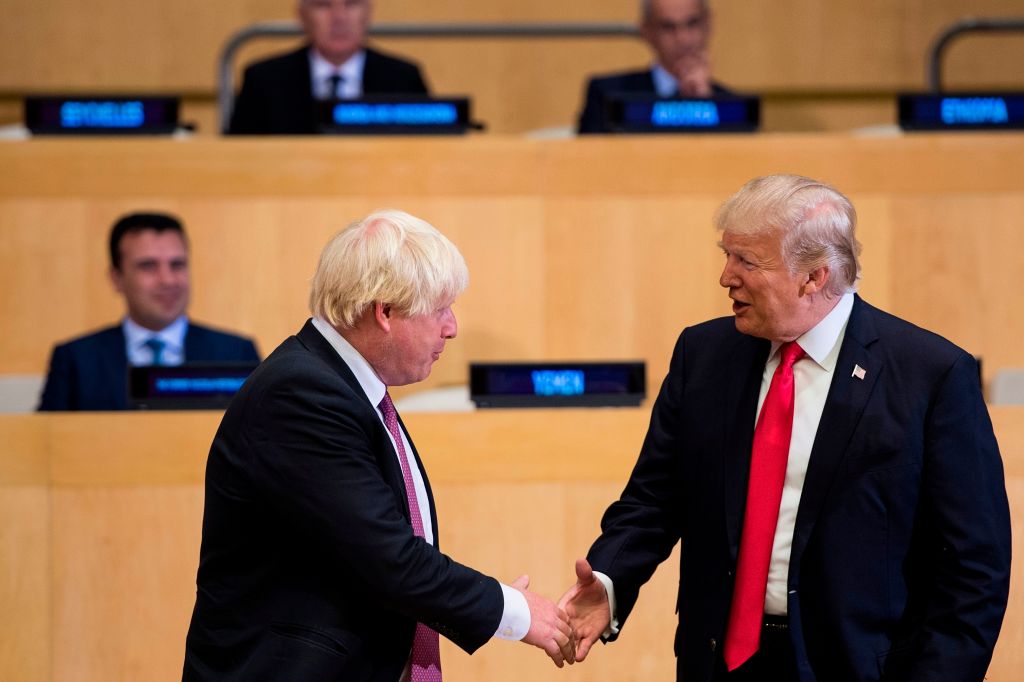On the surface, Donald Trump and Boris Johnson look like two peas in a pod. Their hairstyles are blonde and moppy. The height of their collective ambition makes the Empire State Building and Big Ben look puny in comparison. Both are proud and unapologetic of their unconventionality and large personalities. Indeed, Trump was so smitten when his pal Boris won the Tory leadership contest that he paid him the ultimate compliment—comparing the incoming PM to himself.
The general consensus thus far is that Donald and Boris will get along like Thelma and Louise. Woody Johnson, Trump’s man in London, told the Guardian, ‘Both these leaders have their own style, but they have similarities and I think they have [a] clear vision of what they want to accomplish.’ Boris’s father, Stanley, predicts both men will have a warm relationship. Back stateside, the New York Times dubbed them ‘allies in disruption’ who want to tear down the walls of the old liberal world order.
Boris likely views Trump as an ally and kindred spirit at a time when he could use both. The PM may also believe Trump is a relatively easy man to understand; all one needs to do is speak fondly of him in front of the cameras, treat him like royalty, and throw him a bone once in a while.
Such a calculation may work in the short-term. But if the PM believes this is a long-term strategy, he is on the verge of making a catastrophic mistake.
The world is littered with the bodies of men and women who felt Trump was a simpleton who could be patted on the head and moulded to their liking. All have eventually witnessed the wrath of Trump’s fury. French President Emmanuel Macron used to be Trump’s best friend in Europe, dining in the Eiffel Tower and marveling at the Bastille Day celebrations together like long lost brothers. Macron thought Trump could be flattered with a few tanks down the main thoroughfare and words of praise about his leadership ability and business acumen. It worked for a while, until it didn’t. As soon as the subject turned to trade, multilateralism, and the Iran nuclear deal, the bromance fell apart.
Theresa May, Boris’s immediate predecessor, also thought she could manage the mercurial president. She jetted to the White House a week after Trump’s swearing in to pour on the compliments. ‘Thank you for inviting me so soon after your inauguration,’ May told Trump, ‘and I’m delighted to be able to congratulate you on what was a stunning election victory.’ The next year, she pulled out all of the stops and tried to dazzle the image-conscience Trump with red carpets, British tradition, and the grace of the Queen. What she got in return was a diatribe in the Sun about her negotiating abilities and how much better Boris Johnson would be as PM—not exactly a great development for May, who had yet to make the decision to bow out from public life.
If Boris was smart, he would use both of these events as lessons and come to the right conclusion: don’t expect the positivity to last very long.
While the PM hopes and prays that his relationship with Trump will be smooth sailing during his tenure, choppy waters are inevitable. The fact that the U.S. and the U.K. have a seven decade-old special relationship doesn’t much matter to Trump, who views alliances as inherently unfair and disadvantageous to the United States and the American taxpayer. If and when Boris finally delivers on Brexit and Washington and London begin new bilateral trade talks, Trump will be as merciless on him as he has been on Xi Jinping, Jean Claude Juncker, and Justin Trudeau. To the current resident of the White House, friendships aren’t really friendships—they are expedient tools to be leveraged in negotiations and discarded the moment the other doesn’t fall in line.
If the PM wants to avoid becoming the next Theresa May, he would do well to recognise that Donald Trump can’t be managed or flattered into complacency. After a year of dealing with his fellow populist across the pond, Boris may even wake up one day and notice his hair being a little thinner, greyer, and less floppy.






Comments